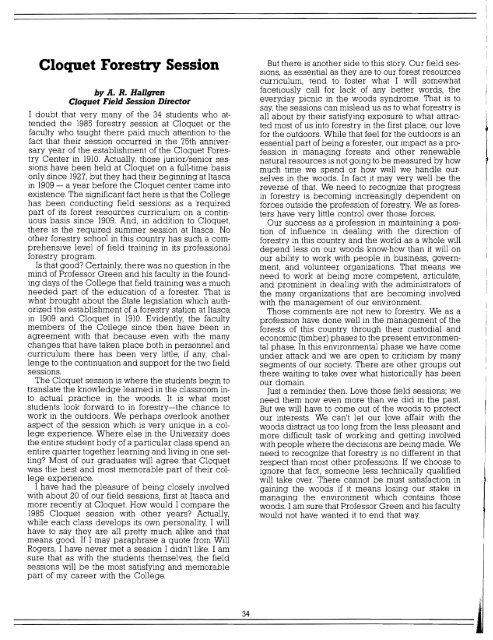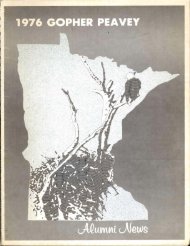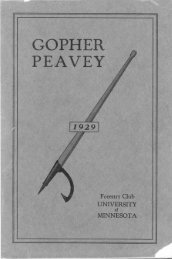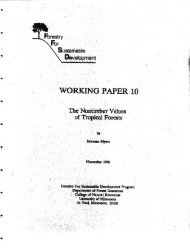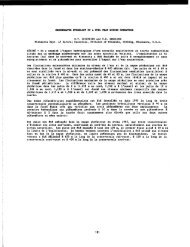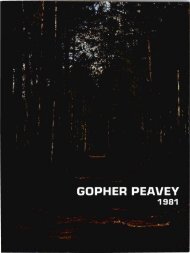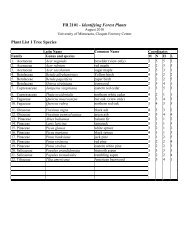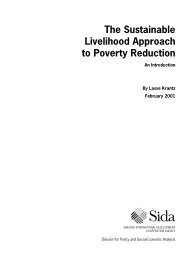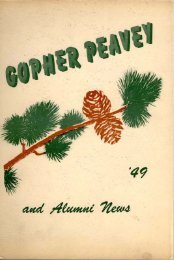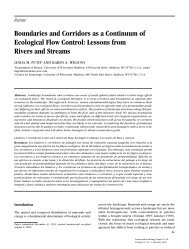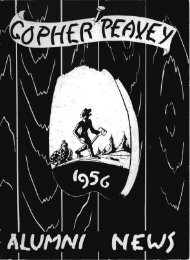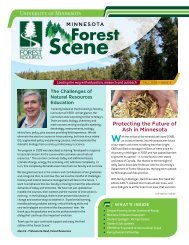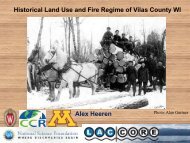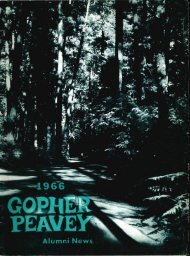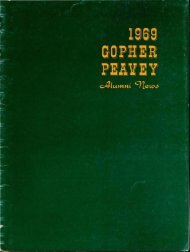Gopher Peavey 1986 - Department of Forest Resources - University ...
Gopher Peavey 1986 - Department of Forest Resources - University ...
Gopher Peavey 1986 - Department of Forest Resources - University ...
Create successful ePaper yourself
Turn your PDF publications into a flip-book with our unique Google optimized e-Paper software.
Cloquet <strong>Forest</strong>ry Session<br />
by A. R. Hallgren<br />
Cloquet Field Session Director<br />
I doubt that very many <strong>of</strong> the 34 students who attended<br />
the <strong>1986</strong> forestry session at Cloquet or the<br />
faculty who taught there paid much attention to the<br />
fact that their session occurred in the 76th anniversary<br />
year <strong>of</strong> the establishment <strong>of</strong> the Cloquet <strong>Forest</strong>ry<br />
Center in 1910. Actually, those junior/senior sessions<br />
have been held at Cloquet on a full-time basis<br />
only since 1927, but they had their beginning at Itasca<br />
in 1909 - a year before the Cloquet center came into<br />
existence. The significant fact here is that the College<br />
has been conducting field sessions as a 'required<br />
part <strong>of</strong> its forest resources curriculum on a continuous<br />
basis since 1909. And, in addition to Cloquet,<br />
there is the required summer session at Itasca. No<br />
other forestry school in this country has such a comprehensive<br />
level <strong>of</strong> field training in its pr<strong>of</strong>essional<br />
forestry program.<br />
Is that good? Certainly, there was no question in the<br />
mind <strong>of</strong> Pr<strong>of</strong>essor Green and his faculty in the founding<br />
days <strong>of</strong> the College that field training was a much<br />
needed part <strong>of</strong> the education <strong>of</strong> a forester. That is<br />
what brought about the State legislation which authorized<br />
the establishment <strong>of</strong> a forestry station at Itasca<br />
in 1909 and Cloquet in 1910. Evidently, the faculty<br />
members <strong>of</strong> the College since then have been in<br />
agreement with that because even with the many<br />
changes that have taken place both in personnel and<br />
curriculum there has been very little, if any, challenge<br />
to the continuation and support for the two field<br />
sessions.<br />
The Cloquet session is where the students begin to<br />
translate the knowledge learned in the classroom into<br />
actual practice in the woods. It is what most<br />
students look forward to in forestry-the chance to<br />
work in the outdoors. We perhaps overlook another<br />
aspect <strong>of</strong> the session which is very unique in a college<br />
experience. Where else in the <strong>University</strong> does<br />
the entire student body <strong>of</strong> a particular class spend an<br />
entire quarter together learning and living in one setting?<br />
Most <strong>of</strong> our graduates will agree that Cloquet<br />
was the best and most memorable part <strong>of</strong> their college<br />
experience.<br />
I have had the pleasure <strong>of</strong> being closely involved<br />
with about 20 <strong>of</strong> our field sessions, first at Itasca and<br />
more recently at Cloquet. How would I compare the<br />
1985 Cloquet session with other years? Actually,<br />
while each class develops its own personality, I will<br />
have to say they are all pretty much alike and that<br />
means good. If I may paraphrase a quote from Will<br />
Rogers, I have never met a session I didn't like. I am<br />
sure that as with the students themselves, the field<br />
sessions will be the most satisfying and memorable<br />
part <strong>of</strong> my career with the College.<br />
But there is another side to this story. Our field sessions,<br />
as essential as they are to our forest resources<br />
curriculum, tend to foster what I will somewhat<br />
facetiously call for lack <strong>of</strong> any better words, the<br />
everyday picnic in the woods syndrome. That is to<br />
say, the sessions can mislead us as to what forestry is<br />
all about by their satisfying exposure to what attracted<br />
most <strong>of</strong> us into forestry in the first place, our love<br />
for the outdoors. While that feel for the outdoors is an<br />
essential part <strong>of</strong> being a forester, our impact as a pr<strong>of</strong>ession<br />
in managing forests and other renewable<br />
natural resources is not going to be measured by how<br />
much time we spend or how well we handle ourselves<br />
in the woods. In fact it may very well be the<br />
reverse <strong>of</strong> that. We need to recognize that progress<br />
in forestry is becoming increasingly dependent on<br />
forces outside the pr<strong>of</strong>ession <strong>of</strong> forestry. We as foresters<br />
have very little control over those forces.<br />
Our success as a pr<strong>of</strong>ession in maintaining a position<br />
<strong>of</strong> influence in dealing with the direction <strong>of</strong><br />
forestry in this country and the world as a whole will<br />
depend less on our woods know-how than it will on<br />
our ability to work with people in business, government,<br />
and volunteer organizations. That means we<br />
need to work at being more competent, articulate,<br />
and prominent in dealing with the administrators <strong>of</strong><br />
the many organizations that are becoming involved<br />
with the management <strong>of</strong> our environment.<br />
Those comments are not new to forestry. We as a<br />
pr<strong>of</strong>ession have done well in the management <strong>of</strong> the<br />
forests <strong>of</strong> this country through their custodial and<br />
economic (timber) phases to the present environmental<br />
phase. In this environmental phase we have come<br />
under attack and we are open to criticism by many<br />
segments <strong>of</strong> our society. There are other groups out<br />
there waiting to take over what historically has been<br />
our domain.<br />
Just a reminder then. Love those field sessions; we<br />
need them now even more than we did in the past.<br />
But we will have to come out <strong>of</strong> the woods to protect<br />
our interests. We can't let our love affair with the<br />
woods distract us too long from the less pleasant and<br />
more difficult task <strong>of</strong> working and getting involved<br />
with people where the decisions are being made. We<br />
need to recognize that forestry is no different in that<br />
respect than most other pr<strong>of</strong>essions. If we choose to<br />
ignore that fact, someone less technically qualified<br />
will take over. There cannot be must satisfaction in<br />
gaining the woods if it means losing our stake in<br />
managing the environment which contains those<br />
woods. I am sure that Pr<strong>of</strong>essor Green and his faculty<br />
would not have wanted it to end that way.


